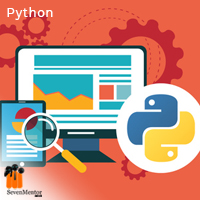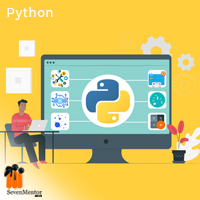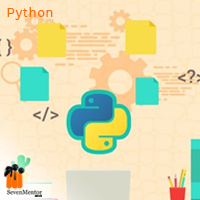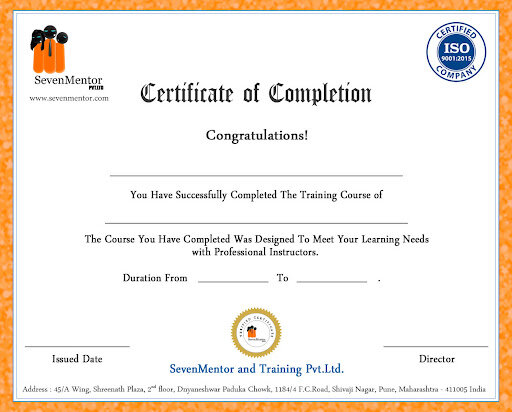Python
A Python Developer is an artist who can create logic and establish creativity. Python, created by Guido van Rossum in 1991, is one of the most popular computer languages for automating specialised repetitive processes.
Call The Trainer
Batch Timing
- Regular: 2 Batches
- Weekends: 2 Batches
Request Call Back
Class Room & Online Training Quotation
About Python
Many developers/programmers have contributed significantly to the language's evolution. Python Course in Jamnagar is a reasonable place to commence if you're new to programming. Python training in Jamnagar interpreters are available for a variety of operating systems, including Linux, Mac OS X, and Windows. Python is a versatile language, which means it can be used in a wide range of applications, from 3D modelling software to web development. For small projects, you can use a shell or shell to develop Python code. However, for larger projects, we recommend using a dedicated code editor or an integrated development environment (IDE).
Python Programming Environment Requirements
We have included some major and standard characteristics and needs that are required by every project throughout and after the construction process. A project may have more needs than those listed below, but these are the essentials that an IDE must have.
Reload and Save the Source Code
An IDE or editor must store your work and reopen it in the same state as when you left, saving time for development.
Within the Environment Execution
It should include a compiler to run your code. If you are not utilizing the exact software, it is most apt a text editor.
Support for Debugging
The debugger in most IDEs allows you to step through your code and set breakpoints.
Python course in Jamnagar
All seasoned Python developers (Pythonistas) promote the virtues of producing Pythonic code. If you've spent any time creating Pythonic code, you've probably come across the best practises. But what is Pythonic programming, and how should you remember the primary pain spots and avoid obvious (poor) practises? Fortunately, the Python community has a rather basic and comprehensive set of coding style principles and "Pythonic" idioms. This is one of the primary reasons behind Pythonic code's great readability. Python is built on readability and simple syntax.
Pylint
Pylint is a Python programming language quality checker that adheres to the PEP 8 style guide. This paper contains standards for writing clear Python code with the primary purpose of enhancing readability and uniformity. Because code is read far more frequently than it is written, it is critical to adhere to norms that will assist us or others in better understanding the accessible code. In this article, we explain 10 PEP 8 guidelines that can make your Python code easier to read for others, as well as how we can test them with Pylint.
What exactly is code quality of Python training in Jamnagar?
Who wouldn't want to 0write good code? However, in order to increase code quality, we must first define what it is.
A basic Google search produces a plethora of results describing code quality. As it turns out, the phrase can signify a variety of things to different people.
One approach to defining code quality is to focus on one end of the spectrum: high-quality code. Hopefully, you can agree on the high-quality code IDs listed below:
It accomplishes its purpose.
It is free of flaws and difficulties.
It's simple to read, maintain, and expand.
These three identities, while basic, appear to be widely accepted. In order to build on these concepts, let's look at why each one is important.
How to Improve the Quality of Python class in Jamnagar Code
On our quest for high-quality code, there are a few things to keep in mind. First and foremost, this is not an objective voyage. There are some strong opinions about what high-quality code should look like.
While everyone may hopefully agree on the descriptors listed above, the path to achieving them is a subjective one. When discussing readability, upkeep, and extensibility, the most heated debates frequently ensue.
So, while this post will attempt to remain objective throughout, keep in mind that there is a very opinionated world out there when it comes to code.
Python programme
Python has lately risen to prominence as one of the world's most popular programming languages. It's used for everything from machine learning to website building and software testing. It can be utilised by both developers and non-developers. Python course in Jamnagar, one of the world's most popular programming languages, is responsible for everything from Netflix's recommendation system to the software that powers self-driving cars. Python is a general-purpose programming language, which means it can be used for a wide range of tasks such as data science, software and web development, automation, and general job completion. Python is normally wielded for website and software development, chore automation, data analysis, and data visualisation. Python has been adopted by many non-programmers because it is comparatively simple to learn. Writing programmes is certainly a flexible and fulfilling vocation . You can build programmes for an assortment of reasons, encompassing earning a living, solving a challenging data analysis challenge, having fun, and enabling someone else to solve a problem.
What can Python do for you?
Machine learning and data analysis
Automation or scripting in web development
Prototyping and testing of software
Routine tasks
What makes Python so popular?
Python is widely used for a variety of purposes. Here's a closer look at what makes it so adaptable and simple to use for coders.
It uses a basic syntax that is similar to natural English, making it easier to read and understand. This allows for faster project development and improvement.
It's adaptable. Python can be used for a wide range of activities, including web development and machine learning.
It is user-friendly for beginners, making it popular among beginning programmers.
It's open source, which means you can use and share it for free, even for business purposes.
Python's repository of modules and libraries—bundles of code written by third-party users to extend Python's capabilities—is huge and increasing.
Python has a sizable and active user base.
JavaScript vs Python – Language Comparison
A scripting language is JavaScript. In other words, it facilitates user interaction by automating website and app procedures. JavaScript was created as a front-end language to add dynamic functionality to browsers that was just not possible with HTML and CSS. After Node.js debuted as a backend language in 2009, JavaScript's popularity skyrocketed since developers could use JavaScript to programme both the front-end and the server-side. Python, on the other hand, is a programming language that is object-oriented. This is the type of programming language that enables programmers to create apps and websites by utilising objects that are nothing more than virtual building blocks. Languages such as Python use the object model to decrease complexity by providing programmers with a logical structure.
Online Classes
Students' learning must be of high quality. New technology trends and concepts are numerous, and firms that use Online Python Course in Jamnagar have benefited in numerous ways. SevenMentor & Training Pvt. Ltd. improves students' technological skills. Our regular activities and tests assist you in bettering yourself. Graduates who want to study more are welcome in the educational environment. We encourage placements and other courses that are important for students' future professions.
Course Eligibility
- Freshers
- BE/ Bsc Candidate
- Any Engineers
- Any Graduate
- Any Post-Graduate
- Working Professionals
Syllabus of Python
- Session 1: Introduction to Python
- What are Python and the history of Python?
- Unique features of Python
- Python-2 and Python-3 differences
- Install Python and Environment Setup
- First Python Program
- Python Identifiers, Keywords, and Indentation
- Comments and document interlude in Python
- Command-line arguments
- Getting User Input
- Python Data Types
- What are the variables?
- Python Core objects and Functions
- Number and Maths
- Week 1 Assignments
- Session 2: Control Statements
- If-else
- If-elif-else
- while loop
- for loop
- Break
- Continue
- Assert
- Pass
- return
- Session 3: List, Ranges & Tuples in Python
- Introduction
- Lists in Python
- More about Lists
- Understanding Iterators
- Generators, Comprehensions and Lambda Expressions
- Introduction
- Generators and Yield
- Next and Ranges
- Understanding and using Ranges
- More About Ranges
- Ordered Sets with tuples
- Session 4: Python Dictionaries and Sets
- Introduction to the section
- Python Dictionaries
- More on Dictionaries
- Sets
- Python Sets Examples
- Session 5: Input and Output in Python
- Reading and writing text files
- Writing Text Files
- Appending to Files and Challenge
- Writing Binary Files Manually
- Using Pickle to Write Binary Files
- Session 6: Python built-in function
- Python user-defined functions
- Python packages functions
- Defining and calling Function
- The anonymous Functions
- Loops and statement in Python
- Python Modules & Packages
- Session 7: Python Object Oriented
- Overview of OOP
- The self variable
- Constructor
- Types Of Variables
- Namespaces
- Creating Classes and Objects
- Inheritance
- Types of Methods
- Instance Methods Static Methods Class Methods
- Accessing attributes
- Built-In Class Attributes
- Destroying Objects
- Abstract classes and Interfaces
- Abstract Methods and Abstract class
- Interface in Python
- Abstract classes and Interfaces
- Session 8: Exceptions
- Errors in Python
- Compile-Time Errors
- Runtime Errors
- Logical Errors
- What is Exception?
- Handling an exception
- Try …except…else
- try-finally clause
- The argument of an Exception
- Python Standard Exceptions
- Raising an exceptions
- User-Defined Exceptions
- Session 9: Python Regular Expressions
- What are regular expressions?
- The match Function
- The search Function
- Matching vs searching
- Search and Replace
- Extended Regular Expressions
- Wildcard
- Session 10: Python Multithreaded Programming
- What is multithreading?
- Difference between a Process and Thread
- Concurrent Programming and GIL
- Uses of Thread
- Starting a New Thread
- The Threading Module
- Thread Synchronization
- Locks
- Semaphore
- Deadlock of Threads
- Avoiding Deadlocks
- Daemon Threads
- Session 11: Using Databases in Python
- Python MySQL Database Access
- Install the MySQLdb and other Packages
- Create Database Connection
- CREATE, INSERT, READ Operation
- DML and DDL Operation with Database
- Graphical User Interface
- GUI in Python
- Button Widget
- Label Widget
- Text Widget
- Session 12: Django Web Framework in Python
- Introduction to MVC and MVT architecture on web development.
- Django folder structure flow of control.
- Session 13: Web scraping in python
- Session 14: Introduction to Data Science
Trainer Profile of Python
Our Trainers explains concepts in very basic and easy to understand language, so the students can learn in a very effective way. We provide students, complete freedom to explore the subject. We teach you concepts based on real-time examples. Our trainers help the candidates in completing their projects and even prepare them for interview questions and answers. Candidates can learn in our one to one coaching sessions and are free to ask any questions at any time.
- Certified Professionals with more than 8+ Years of Experience
- Trained more than 2000+ students in a year
- Strong Theoretical & Practical Knowledge in their domains
- Expert level Subject Knowledge and fully up-to-date on real-world industry applications
Python Exams & Certification
SevenMentor Certification is Accredited by all major Global Companies around the world. We provide after completion of the theoretical and practical sessions to fresher’s as well as corporate trainees.
Our certification at SevenMentor is accredited worldwide. It increases the value of your resume and you can attain leading job posts with the help of this certification in leading MNC’s of the world. The certification is only provided after successful completion of our training and practical based projects.
Proficiency After Training
- Code in Python
- Create Python Program for Enterprise Application
- Web Application Development
- Game Development
- You can build more complex apps with minimal lines of code
- Can develop more secure web solutions with Python
- Python helps you in secure programming and fixes problems
- How to reduce the chances of cyber-attacks
- Will learn the calculation of most complex problems with ease
Key Features
Skill level
From Beginner to Expert
We are providing Training to the needs from Beginners level to Experts level.
Course Duration
12 weeks
Course will be 90 hrs to 110 hrs duration with real-time projects and covers both teaching and practical sessions.
Total Learners
2000+ Learners
We have already finished 100+ Batches with 100% course completion record.
Frequently Asked Questions
Batch Schedule
| DATE | COURSE | TRAINING TYPE | BATCH | CITY | REGISTER |
|---|---|---|---|---|---|
| 16/12/2024 |
Python |
Online | Regular Batch (Mon-Sat) | Jamnagar | Book Now |
| 17/12/2024 |
Python |
Online | Regular Batch (Mon-Sat) | Jamnagar | Book Now |
| 21/12/2024 |
Python |
Online | Weekend Batch (Sat-Sun) | Jamnagar | Book Now |
| 21/12/2024 |
Python |
Online | Weekend Batch (Sat-Sun) | Jamnagar | Book Now |
Students Reviews
Several of the largely intriguing courses I've ever taken. Trainers were quite helpful and offered excellent instruction.
- Priti Nair
SevenMentor's CCNA course was fantastic. Extraordinary training sessions assisted me in broadening my comprehension. Thank you so much, SevenMentor Institute.
- Neelam Kawde
It's a relaxed atmosphere. Classes that are stable and simple to grasp. I not only learned new talents, but I also made new friends with the trainers.
- Kaushal Bajpai
Course video & Images



Corporate Training
The Corporate Python training in Jamnagar provided by SevenMentor & Training Pvt. Ltd is not limited to one. Those with prior knowledge might enrol in Corporate Python Course in Jamnagar to quickly improve abilities. SevenMentor & Training Pvt. Ltd provides both classroom and on-the-job training. As a result, people who enrolled have a better chance of getting employed or performing well in their respective organisations.
Our Placement Process

Eligibility Criteria

Placements Training

Interview Q & A

Resume Preparation

Aptitude Test

Mock Interviews

Scheduling Interviews

Job Placement

Related Courses
Have a look at all our related courses to learn from any location
At SevenMentor, we are always striving to achieve value for our candidates. We provide the Best Big Data Hadoop Training which includes all recent technologies and tools. Any candidate from...
Django is a simple , free and open-source web development framework, written in Python. A web framework contains a set of components that helps us to develop websites faster and...
Request For Call Back
Class Room & Online Training Quotation

